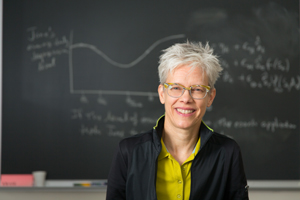The UK Royal Statistical Society has announced the recipients of its 2019 honours, who will be presented with their awards at a ceremony during their annual conference in Belfast this September. Notable among these are the Guy Medals in Silver and Bronze, which will be presented to Susan Murphy and Jonas Peters, respectively, and the RSS Research Prize, to Tengyao Wang. In addition, the Guy Medal in Gold will be presented to Stephen Buckland, and the Barnett Award to Marian Scott.
The Guy Medal in Silver is awarded to Susan Murphy, IMS Fellow and President-Elect, for her methodological, computational and applied work on dynamic treatment regimens. Susan’s influential JRSSB paper in 2003 on Optimal Dynamic Treatment Regimens proposed a methodology for estimating decision regimens that result in a maximal mean response, consistent with an elegantly-defined regret function and for use with experimental or observational data. Substantial follow-up work on multi-stage decision making has built on this paper, including Susan’s own work ranging from sample size determination to performance guarantees for individualized treatment rules and applications ranging from addictions to micro-randomized optimization of mobile health interventions for the Fitbit generation.
The Guy Medal in Bronze is awarded to IMS member Jonas Peters (University of Copenhagen) for important and innovative contributions to causal inference and related statistical methodology and theory. Of particular note are his two papers in JRSSB, namely ‘Kernel-based tests for joint independence’ (with N. Pfister, P. Bühlmann and B. Schölkopf), published in 2017, and ‘Causal inference using invariant prediction: identification and confidence intervals’ (with P. Bühlmann and N. Meinshausen), which was read to the Society in 2016.
The RSS Research Prize is awarded to IMS member Tengyao Wang for his outstanding and diverse contributions to statistical methodology and theory. Amongst other research, he has given new understanding about computational and statistical trade-offs; developed theory for multi-dimensional shape constrained estimators; and introduced a new paradigm and method for detecting changes in high-dimensional data streams.
More at https://www.statslife.org.uk/news/4045-announcing-our-honours-recipients-for-2019



Comments on “Royal Statistical Society presents 2019 awards”